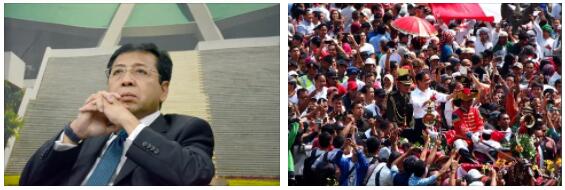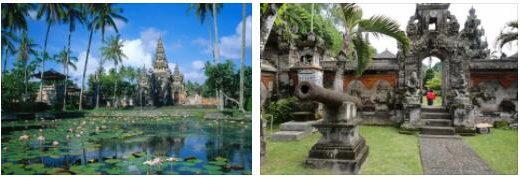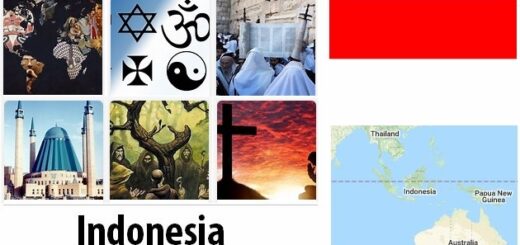State Structure and Political System of Indonesia
Indonesia is a unitary state with a presidential form of government. The President is the head of state and the government formed by him, the supreme commander of the Armed Forces. Check equzhou for political system of Indonesia.
Indonesia has 32 provinces, including two special regions: Nanggru Aceh Darussalam, North Sumatra, West Sumatra, Riau, Jambi, South Sumatra, Bengkulu, Lampung, Bangka Belitung Archipelago, D.K.I. Jakarta, West Java, Central Java, D.I.Yogyakarta, East Java, Banten, Bali, West Nusa Tenggara, East Nusa Tenggara, West Kalimantan, Central Kalimantan, South Kalimantan, East Kalimantan, North Sulawesi, Central Sulawesi, South Sulawesi, South East Sulawesi, Gorontalo, Molucku, North Molucku, Papua, East Papua, West Papua. Administrative divisions of the second category are districts (kebupaten, 268) and municipalities (kotamdya, 85); subdistricts (kecamatan, 4,424); villages (desa, 68 819).
Millionaire cities: Jakarta, Surabaya, Bandung, Semarang, Medan, Palembang, Banjarmasin. The growth of Makassar is promising. Each province has its own capital.
The Constitution of 1945 is in force. In October 1999 – May 2002, at meetings of the highest legislative body – the NCC, amendments to the Constitution were adopted, according to which the number of members of the NCC remains the same (700), but some of them (500) are members of parliament, the rest (200) represent provinces and other groups. The NCC exercises legislative functions. He is empowered to adopt additions and amendments to the Constitution, issue resolutions, approve the government’s course, including economic plans. NCC Chairman Akbar Tanjung. Parliament is unicameral, 500 deputies are elected in general elections. Parliament Speaker Amin Rais. The head of state and government are responsible to parliament.
Parliamentary elections are to be held in 2004 on the basis of a new electoral law that obliges political parties to nominate candidates for parliament, provincial parliaments, municipalities and districts to give at least 30% of the seats of candidates to women. Persons who were members of the KPI cannot be nominated as candidates. Small parties that do not receive the required minimum of votes are prohibited from forming coalitions. In the same year, direct presidential and vice-presidential elections will be held. Their powers are limited to two terms of 5 years.
Executive and legislative power of administrative units. In 2000, the SNP approved the following hierarchy of laws and regulations: the Constitution of 1945, SNP resolutions, laws, government regulations replacing laws, government regulations, presidential decrees, district resolutions.
The country is decentralizing administration and separating powers between the center, provinces and regions. Additional constitutional bodies have been created: parliaments of district representatives. The 2001 amendment to the Constitution provides for the establishment of a Constitutional Court.
Until the fall of the new order regime in 1998, the party system was represented by three political parties – Golkar, PER and DPI. In 1999, 48 out of 126 registered parties were admitted to the parliamentary elections. Check homeagerly for democracy and human rights of Indonesia.
Business organizations: Indonesian Chamber of Commerce and Industry, dozens of industry associations.
In recent years, informal civic associations have become widespread in cities. They include supporters of the protection of national culture, nature, human rights, they provide assistance to the population during natural disasters. A significant role in the social movement is played by numerous youth and women’s organizations, forums of scientists and politicians.
The internal political situation is complicated by the strengthening of centrifugal tendencies, religious and interethnic contradictions, and terrorist acts in a number of regions. To ease tensions, the government is negotiating to avoid violent action. The most difficult situation remains in Aceh.
Indonesia maintains relations with all the leading powers of the world, including the Russian Federation. In May 2003, President I.M. Sukarnoputri, which resulted in the signing by the presidents of the Russian Federation and Indonesia. Declarations on the development of cooperation in all spheres and areas. Indonesia is successfully strengthening its position in ASEAN, APEC, the Non-Aligned Movement, and the Organization of the Islamic Conference.
The total number of Armed Forces in 2001 was 297 thousand, Ground Forces 214 thousand, strategic reserve 30 thousand, special forces 6.2 thousand people. In 1999, a law was passed that reduced the army’s representation in parliament from 75 to 38 seats. A military faction is not envisaged in the future composition of the parliament. The socio-political function of the army was abolished. Subordination and command of the army and police forces are separated. However, the army continues to be an influential force in the domestic political life of the country.
Indonesia has diplomatic relations with the Russian Federation (established with the USSR in 1950).



